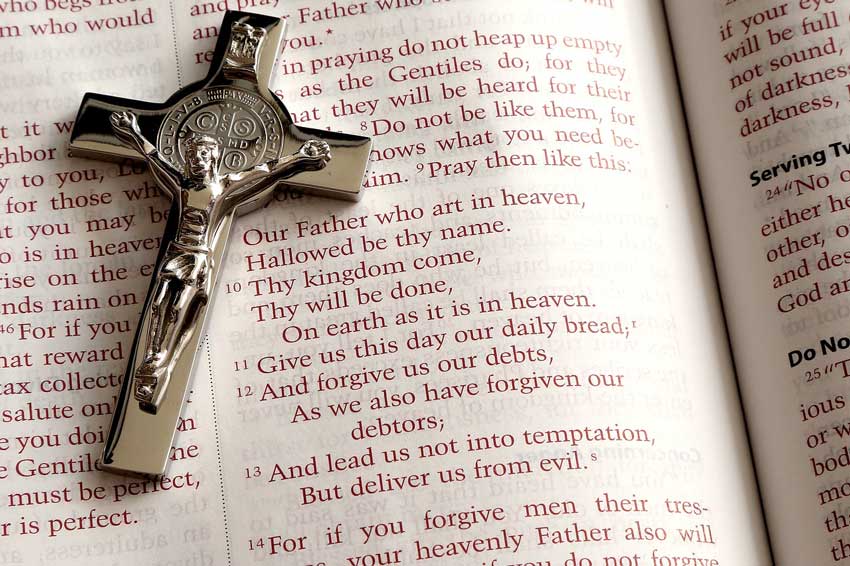
“Dear Father, I was recently at a class in which the teacher said that the Bible was truthful only in spiritual matters, not in historical, scientific or other ones. Is this acceptable?
The teaching of the Church, and indeed of common sense, is that the Bible is truthful in everything it teaches. It has to be that way, since the Bible, all of it, is the word of God. God is the author of Scripture, even though the different books were written by different writers. The Catechism of the Catholic Church, quoting the Second Vatican Council teaches: “God is the author of Sacred Scripture. ‘The divinely revealed realities, which are contained and presented in the text of Sacred Scripture, have been written down under the inspiration of the Holy Spirit’” (CCC 105; DV 11).
If God is the author of all the books of the Bible, the Bible cannot contain error, since God, who is the Truth, would not pass on to man anything erroneous. God can neither deceive nor be deceived.
Again quoting the Second Vatican Council, the Catechism teaches: “The inspired books teach the truth. ‘Since therefore all that the inspired authors or sacred writers affirm should be regarded as affirmed by the Holy Spirit, we much acknowledge that the books of Scripture firmly, faithfully, and without error teach that truth which God, for the sake of our salvation, wished to see confided to the Sacred Scriptures’” (CCC 107; DV 11).
In order to avoid the possible interpretation of this text to mean that only those truths that refer to our salvation are without error, the Council placed commas before and after “for the sake of our salvation”.
This was the teaching of the Church from the beginning. Jesus himself argues from the truthfulness of Scripture to defend his own claim to be God: “Is it not written in your law, ‘I said, you are gods? If he called them gods to whom the word of God came (and Scripture cannot be nullified), do you say of him whom the Father consecrated and sent into the world, ‘You are blaspheming,’ because I said, ‘I am the Son of God?’” (Jn 10:34-36). The phrase “and Scripture cannot be nullified” means that it cannot be in error. The phrase “It is written” is used numerous times in the New Testament when asserting a truth, to mean that whatever is written in the Old Testament scriptures is considered definitive and beyond appeal.
There is no doubt that, because of its intimate connection with the defined dogma of the inspiration of Scriptures, inerrancy, or truthfulness, can be considered an implicitly defined truth of faith
St Jerome was very clear: “The Scripture cannot lie” (In Jer., 31, 55). So too, St Augustine writes in a letter to St Jerome: “I confess to your charity that I have learned to accord to those books of Scripture alone which are nowadays called canonical such reverence and honour, as to believe most firmly that none of their authors committed any error in writing them. And if I find anything in those writings which seems contrary to the truth, I shall merely feel sure that either the manuscript is incorrect, or that the translator has not grasped what was said, or that I myself have not understood” (Ep., 82, 1-3).
In the thirteenth century St Thomas Aquinas wrote: “Whatever is contained in Sacred Scripture is true,” and “He who thinks the contrary is a heretic” (Quodlibet, XII, q. 17, a. 26, ad 1).
Alluding expressly to the writings of St Augustine and St Thomas Aquinas, Pope Leo XIII wrote in his encyclical Providentissimus Deus (1893): “It is utterly impossible for the least error to be divinely inspired. In fact, by its very nature, inspiration not only excludes all error, but makes its presence as utterly impossible as it is for God, the supreme truth, to be the author of any error whatever” (D 1951).
Although the truthfulness of Scripture has not been formally defined as a dogma of faith, the Pontifical Biblical Commission in 1934 went so far as to speak of the “Catholic dogma of the inspiration and inerrancy of the Sacred Scriptures” (Decree on the work of Friedrich Schmidtke, 27 February 1934). There is no doubt that, because of its intimate connection with the defined dogma of the inspiration of the Scriptures, inerrancy, or truthfulness, can be considered an implicitly defined truth of faith.
Related:
